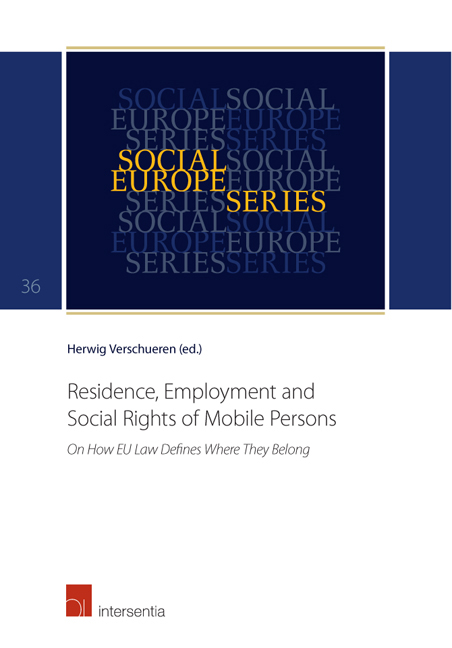Book contents
- Frontmatter
- Preface
- Contents
- List of Abbreviations
- List of Contributors
- Chapter 1 How EU Law Defines where Mobile Persons Belong. An Introduction
- Chapter 2 Family as Link. Explaining the Judicial Change of Direction on Residence Rights of Family Members from Third States
- Chapter 3 The Direction of the Court's Family Reunification Case-Law. A Plea for (Timely) Moderation
- Chapter 4 Sufficient Resources and Residence Rights under Directive 2004/38
- Chapter 5 Free Movement of Persons and European Solidarity. A Melancholic Eulogy
- Chapter 6 Once a Foreigner, Always a Foreigner. Who Does Not Belong Here Anymore? Expulsion Measures
- Chapter 7 Who Does Not Belong Here Anymore? A Statistical Snapshot of Member States’ Practices
- Chapter 8 Civic Integration Exams in EU Immigration Law. What Integration is Not in European Law
- Chapter 9 I Study Here, and Thus I Belong? Mobile Students in the European Union
- Chapter 10 Being Economically Active: How It Still Matters
- Chapter 11 Where Do EU Mobile Workers Belong, According to Rome I and the (E)PWD?
- Chapter 12 Conflicting Rules of Conflict: Social Security and Labour Law
- Chapter 13 Conflicting Rules of Conflict: Social Security and Labour Law. A Response
- Chapter 14 Where Does the UK Belong?
Chapter 14 - Where Does the UK Belong?
Published online by Cambridge University Press: 22 September 2018
- Frontmatter
- Preface
- Contents
- List of Abbreviations
- List of Contributors
- Chapter 1 How EU Law Defines where Mobile Persons Belong. An Introduction
- Chapter 2 Family as Link. Explaining the Judicial Change of Direction on Residence Rights of Family Members from Third States
- Chapter 3 The Direction of the Court's Family Reunification Case-Law. A Plea for (Timely) Moderation
- Chapter 4 Sufficient Resources and Residence Rights under Directive 2004/38
- Chapter 5 Free Movement of Persons and European Solidarity. A Melancholic Eulogy
- Chapter 6 Once a Foreigner, Always a Foreigner. Who Does Not Belong Here Anymore? Expulsion Measures
- Chapter 7 Who Does Not Belong Here Anymore? A Statistical Snapshot of Member States’ Practices
- Chapter 8 Civic Integration Exams in EU Immigration Law. What Integration is Not in European Law
- Chapter 9 I Study Here, and Thus I Belong? Mobile Students in the European Union
- Chapter 10 Being Economically Active: How It Still Matters
- Chapter 11 Where Do EU Mobile Workers Belong, According to Rome I and the (E)PWD?
- Chapter 12 Conflicting Rules of Conflict: Social Security and Labour Law
- Chapter 13 Conflicting Rules of Conflict: Social Security and Labour Law. A Response
- Chapter 14 Where Does the UK Belong?
Summary
INTRODUCTION: MULLING OVER CONNECTIONS
What's in a connection? In this book, scholars across Europe have mulled over one of the most important issues which arise in migration or mobility situations, namely the character and legal regulation of the connections between the mobile person (and their family) and the home and host polities. Meanwhile, in the United Kingdom we have been mulling over another connection, that between the United Kingdom and its 27 fellow Member States, within the legal framework of the European Union. A referendum on UK membership of the EU was promised in the Conservative Party manifesto for the May 2015 General Election and, after the surprise victory of Prime Minister David Cameron and colleagues, legislation in the form of the European Union Referendum Act 2015 has been put in place to permit such a referendum to take place on the question whether the UK should remain in the EU or leave the EU. On 20 February 2016, Cameron announced that the referendum would take place on 23 June 2016.
Migration has become a central element in the debate about UK membership of the EU in recent years, even though it did not merit a mention when Cameron first announced that he supported a referendum in November 2013. It was at the heart of the letter that PM Cameron sent to European Council (EUCO) President Donald Tusk in November 2015, setting out his demands for a ‘renegotiation’. Free movement – and the notion that perhaps the UK public might like it to be a little less ‘free’ (for others, if not for themselves) – has played a central role in the ‘renegotiation’ of the UK's relationship with the European Union led by the UK's Conservative Government since its election in mid 2015. It featured heavily in the draft Decision of the Heads of State and Government published by Tusk at the beginning of February 2016, which was intended to accommodate the UK's ‘special position’ and from then on was contained in each successive draft. In the final version of the EUCO conclusions, Section D of Annex 1, in its general considerations about free movement, refers to the need for a ‘real and effective degree of connection between the [mobile EU citizen] and the labour market of the host Member State’ (emphasis added).
- Type
- Chapter
- Information
- Residence, Employment and Social Rights of Mobile PersonsOn How EU Law Defines Where They Belong, pp. 301 - 316Publisher: IntersentiaPrint publication year: 2016
- 2
- Cited by



